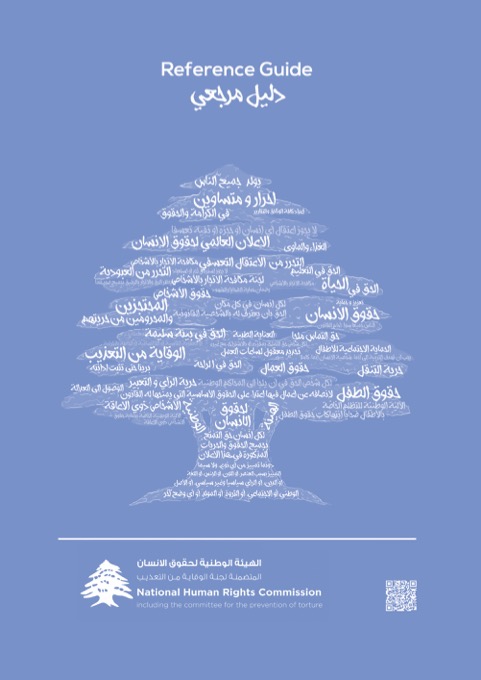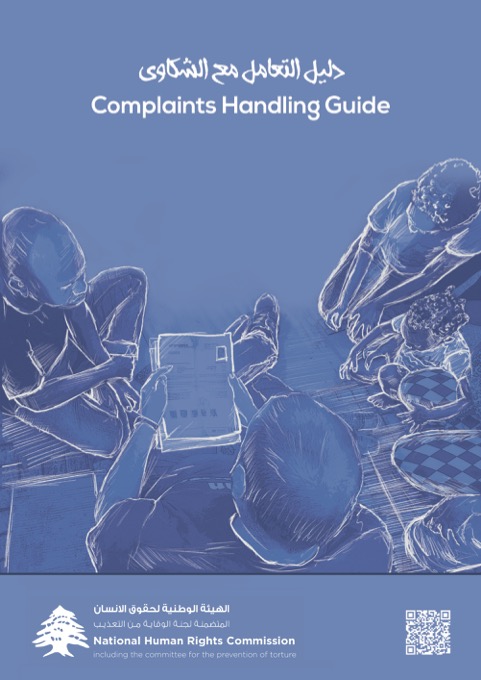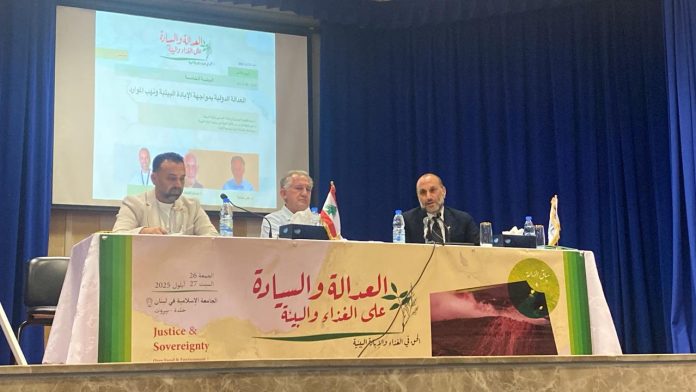The Islamic University in Lebanon – Khaldeh Branch hosted the First Agricultural Conference entitled “Justice and Sovereignty over Food and the Environment – The Right to Food and Environmental Genocide”, organized by the Agricultural Movement in Lebanon, in cooperation with the Union of Tyre District Municipalities – Disaster Management Unit, the Crisis Intervention Cell at the Lebanese University, the Socio-Economic Working Group – Siyak, the Siada Network, and the Arab Network for Food Sovereignty.
Opening Remarks
Following an introduction by journalist Ayman Dandash, the conference opened with a moment of silence for the souls of the martyrs of the Israeli aggression on Lebanon, followed by the Lebanese national anthem.
Dr. Ghassan Jaber, representing the Islamic University, stressed that “this conference sheds light on the severe damages sustained by the agricultural sector as a result of Israeli attacks, especially in southern regions.”
Ms. Sara Salloum, President of the Agricultural Movement in Lebanon, stated that the conference “aims to highlight the realities of agriculture and the difficulties it faces, which directly impact national food security.”
Engineer Razan Zaiter, representing the Arab Network for Food Sovereignty, called for “the launch of permanent conferences to reinforce agriculture as a priority in government policies, considering food security as a national and strategic issue.”
Meanwhile, Mr. Adel Saad, Vice President of the Union of Tyre District Municipalities, stressed that “this conference represents a pivotal station for regaining national policies on food security and strengthening sovereignty over resources.”
Sessions and Interventions
The conference featured several specialized sessions:
-
In the first session, chaired by Bashar Abu Saifan, Dr. Riyad Saadeh presented a lecture diagnosing the agricultural reality in Lebanon, emphasizing the need for accurate statistics to address the sector’s challenges.
-
In a session entitled “Sovereignty over Food and the Environment in the Regional Race”, chaired by Murad Ayash, contributions were made by Engineer Razan Zaiter (Palestine), researcher Wael Gamal (Egypt – via Zoom), Ali Aznag, coordinator of the Siada Network, and Dr. Carla Khattar on behalf of the National Council for Scientific Agricultural Research, who presented a scientific assessment of environmental damages in Lebanon caused by Israeli aggression.
-
In a session entitled “Agriculture, Labor, and Land”, chaired by Sara Salloum, Dr. Mona Khachane spoke on the challenges of preserving agricultural lands, followed by Dr. Kanj Hammadeh on issues of agricultural reform, while Corinne Jabbour and Serge Harfouche presented initiatives by “Jibal Association” and “Our Seeds, Our Roots.”
-
A special session entitled “International Justice in Confronting Environmental Genocide and Resource Plunder” featured two notable interventions: the first by Bassam Al-Kantar, Commissioner for International Relations and Media at Lebanon’s National Human Rights Commission, and the second by Dr. Omar Nashabe, addressing the roles of international frameworks in combating environmental genocide.
Al-Kantar’s Intervention
In his intervention entitled “Access to Healthy Food and a Safe Environment as Fundamental Human Rights”, Al-Kantar emphasized that the International Covenant on Economic, Social and Cultural Rights guarantees in Articles (11) and (12) the right to adequate food and to a healthy environment, stressing that these rights are interdependent and inseparable.
He highlighted the role of national human rights institutions in respecting, protecting, and fulfilling these rights through monitoring public policies, holding authorities accountable, and regulating private sector practices.
He also called for the adoption of the draft law proposed by MP Inaya Ezzeddine on “The Right to Food and the Establishment of the National Council for Food Systems,” which stipulates the creation of a permanent committee to protect the right to food within the National Human Rights Commission.
Recommendations
Al-Kantar presented a set of key recommendations, including:
-
Adopting a legislative and regulatory framework for the right to food: advancing the draft law on the right to food and establishing the National Council for Food Systems to ensure a binding legal reference with clear implementation mechanisms.
-
Establishing a permanent specialized committee: activating the “Committee for the Protection of the Right to Food” within the National Human Rights Commission and providing it with adequate resources.
-
Integrating the right to food and environment into a National Human Rights Plan (2026–2030): making it a binding public policy with clear implementation indicators.
-
Ensuring the independence of the National Human Rights Commission: safeguarding it from political or executive interference.
-
Strengthening protection for the most vulnerable groups: including children, women, refugees, persons with disabilities, and small-scale farmers in national food and environmental security policies.
-
International accountability mechanisms: calling for an independent international mechanism to investigate violations linked to Israeli aggression on Lebanon and Gaza, including environmental and food-related crimes, and to refer perpetrators to the International Criminal Court.
-
Integrating the environmental dimension in transitional justice: recognizing environmental destruction as a systematic crime during armed conflicts and embedding it in accountability frameworks.
-
Building a national database: developing national monitoring and documentation mechanisms, in cooperation with municipalities and civil society, to establish accurate data on food and environmental violations.
-
Launching a national emergency plan for food and the environment: ensuring access to food, water, and healthcare during crises and wars.
-
Strengthening partnerships and international cooperation: consolidating collaboration with UN bodies, agricultural movements, and civil society organizations to exchange expertise and coordinate efforts to safeguard food systems and confront environmental challenges.
هذه المقالة متاحة أيضًا بـ: العربية (Arabic) Français (French)



